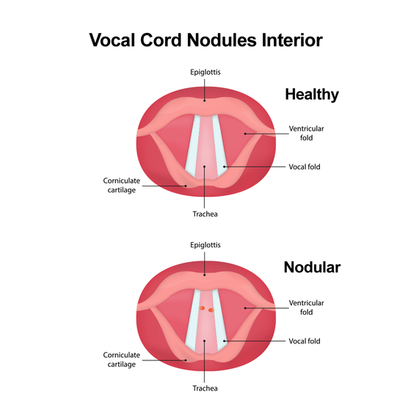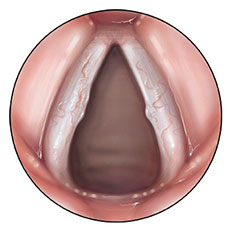But that isn’t always the case. A hoarse, raspy voice can be caused by a number of factors. Some of those might be more temporary or short term. Other possible causes, like vocal nodules, can lead to more ongoing changes in a child’s voice.
Research shows that voice disorders like this can negatively impact a child’s quality of life.
Socially, a child may be self-conscious or avoid speaking in certain situations due to their voice. Changes in a child’s vocal quality can affect his or her speech intelligibility, making it more difficult for others to understand them. It can also lead to voice disorders in adulthood.
What should parents look for and when is it time to worry about a child’s raspy voice? Here’s a breakdown of the signs, possible causes of a hoarse voice, and what parents should do when they notice this.
Signs of a Raspy Voice
Hoarse, breathy, raspy, rough…this is what it can sound like when our vocal cords can become irritated.
According to the American Speech, Language, Hearing Association (ASHA), up to 7% of children may experience a voice disorder. And about 1 in 13 adults will experience a voice problem at some point throughout the year.
If you notice hoarseness in your child’s speech, think about the following:
- How long has your child had this vocal quality?
- Does it seem to come and go frequently?
- Does your child chronically have a raspy voice?
- Have you noticed any behaviors in your child that could be leading to changes in his or her voice? (for example, excessive yelling or screaming)
Taking note of the answers to these questions can be helpful in determining what might be causing your child to have a low, rough quality to their voice, and when to seek treatment.
If you do seek a professional opinion, this information can also help guide the specialist’s assessment and diagnosis.
Possible Causes
Vocal Nodules
One of the most common causes of Dysphonia (a voice disorder such as a raspy voice) is the presence of vocal cord nodules.
Similar to how we develop calluses on our hands, nodules are bumps that can form on the vocal cords.
These bumps are benign (non-cancerous), and are defined as swelling (typically on both sides) of the membranes on the vocal cords.
When we speak, our vocal cords (referred to by specialists as “vocal folds”) vibrate. Nodules on the vocal cords interfere with these vibrations, which can make a child’s voice sound hoarse.
Vocal nodules can be caused from chronic abuse of a child’s voice.
Vocal abuse includes doing things like constant yelling, screaming, or singing, over time. According to Children’s Hospital of Philadelphia, Gastroesophageal Reflux Disease (GERD) can cause additional swelling, which can make symptoms of vocal cord nodules worse.
Vocal Cord Polyps
Vocal cord polyps can also be caused by trauma to the vocal cords over time by excessive yelling, screaming, or singing.
They can form on just one side of the vocal cords or both, and contain more blood vessels than vocal cord nodules.
Vocal cord polyps look similar to blisters, and can also cause children to have a hoarse, rough quality to their voice.
Other Causes
There are other causes for a child to have a hoarse voice. These include:
- Viral illness (such as a cold)
- Allergens (such as pollen)
- Scarring of the vocal cords (for example, from a breathing tube placed during surgery)
If your child has shown any other symptoms for the above, consider that these may be the cause for changes in their voice.
When to Worry
So, when should parents worry about their child’s raspy voice?
First, consider the length of time your child has shown this type of vocal quality. Some sources recommend seeing a professional for an evaluation if the vocal quality has lasted longer than 2 to 3 weeks.
If your child’s raspy voice appears to be affecting his or her quality of life – others are teasing them, they are avoiding speaking in certain environments, or are self-conscious about their speech within social settings, it could be time to seek a professional opinion.
A raspy voice can also make it more difficult for others to understand your child’s speech. If their speech intelligibility is affected in this way, you may also want to consider having your child evaluated.
Where to Go with Concerns
An Ear, Nose, and Throat doctor (ENT), and a Speech-Language Pathologist (SLP) can evaluate your child if you are concerned with his or her voice.
As part of the evaluation, the ENT or Speech-Language Pathologist may collect a thorough history from you, listen to the child’s voice, and possibly perform a procedure called a laryngoscopy (endoscopy of the vocal cords).
A laryngoscopy involves a camera on a small, spaghetti-like tube placed through the child’s nose, down to the larynx to view the vocal cords.
A stroboscopy is another evaluation in which a camera is placed through the child’s nose, then through the pharynx and above the level of the vocal cords. This evaluation instrument allows the professional to view the movement of the vocal cords when they vibrate.
Following the evaluation, you’ll be provided with recommendations for what to do next. These will depend on the cause for the child’s hoarse voice, but could include:
- Further evaluation by a Speech-language Pathologist (also known as a Speech Therapist)
- Voice therapy through weekly, ongoing speech therapy
- Behavioral recommendations (such as reducing vocally abusive behaviors and practicing good vocal hygiene by doing things like staying hydrated)
- Surgery (if improvements are not noted through speech therapy).
How to Receive Individualized Services
A raspy voice can affect your child’s quality of life and how well others can understand his or her speech.
If you have concerns about your child’s hoarse voice, consider seeking an evaluation by a Speech-Language Pathologist.
The Speech-Language Pathologist can assess your child for signs and symptoms of vocal cord nodules. Voice Therapy through speech therapy can help improve the quality of your child’s voice, by teaching him or her how to modify behaviors that could be causing changes in their speech.
TherapyWorks offers speech therapy, occupational and physical therapy both in person (in Illinois, Michigan, and Ohio) and through teletherapy (nationwide). If you would like to learn more, or discuss your child’s specific needs, please don’t hesitate to reach out to TherapyWorks!










